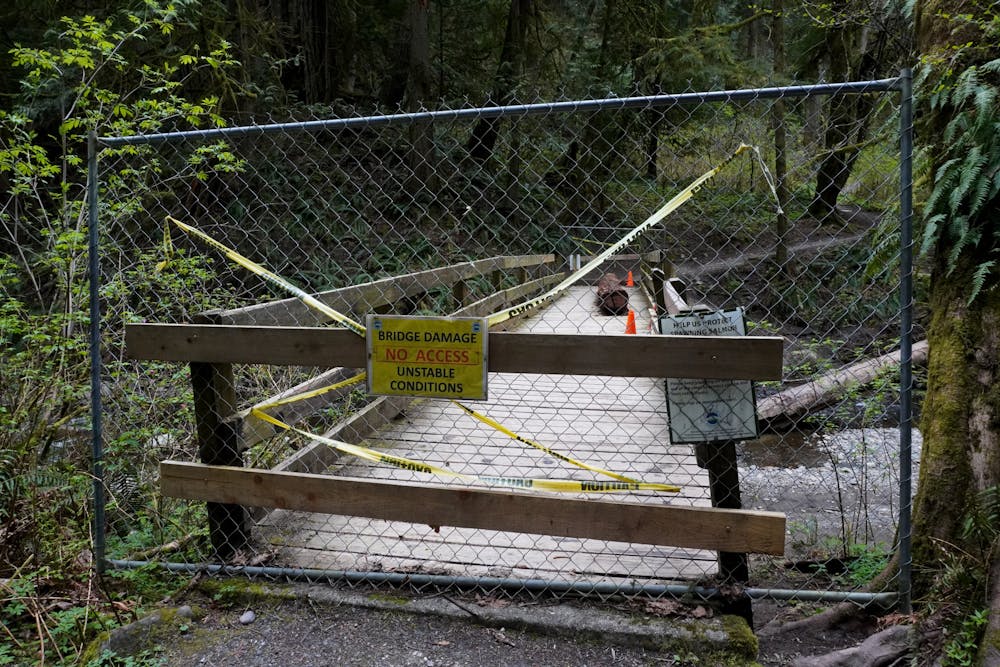Construction on Arroyo Park's closed and damaged bridge above Chuckanut Creek could begin this summer, but it all depends on decisions made by the Washington Department of Fish and Wildlife.
WDFW would have to approve the permits for minor repairs rather than the major repairs they’ve been calling for, according to Nicole Oliver, the director of Bellingham's Parks and Recreation.
Oliver said if they cannot persuade WDFW that Arroyo Park’s bridge only needs minor repairs, construction will not start this summer, and they will need to go back to planning.
Since June 2021, the bridge at Arroyo Park has been closed due to unstable conditions, but Oliver said it has been on the list of bridges that need repair since 2018. Arroyo Park’s bridge was bumped to the top of the list when a tree fell on it in June 2021, causing damage that warranted deeper repairs than initially planned.
The tree is still sitting on the bridge, with two cones on each end blocking it off.
“When the tree fell, it damaged the wooden stringer to the point where it needed to be fixed, and because we were going in there anyway, we felt it was prudent to replace it with something that would last a lot longer,” Oliver said. “So we are replacing the decking and the girders of the one span of the bridge with steel.”
Getting the materials to the bridge is complicated due to the narrow forested area at Arroyo Park, but Oliver said the designs to fix the bridge are ready.
“What the WDFW is saying is, ‘sorry the tree fell, but since you’re fixing it anyway, you need to make it even more environmentally protective of the creek than it is right now,’” Oliver said.
This bridge is a historic structure so when it undergoes repairs, it does not need to be brought up to code because the way it was originally built wouldn’t be allowed now because of current environmental regulations, according to Oliver.
Oliver said. “It would have wide-reaching consequences if every time a tree falls, you have to bring the entire thing up to regulation; it's really a stretch.” Oliver said.
Oliver said that if WDFW decides to hold the bridge to that higher standard after negotiations, they will need to appeal that permitting decision.
Hannah Hein, a graduate student studying environmental science at Western Washington University who frequents Arroyo Park for trail running and biking, said she understands why it might take longer than expected to fix the bridge, but currently there is not a good alternative to access the trails on the other side.
“I’ll run from town using the interurban that goes by Fairhaven park and I would normally cross that bridge and then get into the Chuckanut trails,” Hein said. “But unless you’re parking at the north trailhead, there's not a good way to connect the interurban that goes from Chuckanut into Fairhaven without having to go on the road, which is kind of dangerous since it’s a fast road, and it's pretty busy.”
Todd Elsworth, the executive director of Recreation Northwest, a group that hosts outdoor recreation and nature education classes and tours, said he thinks the best solution to cross that creek would be to reinstall a historic suspension high bridge.
“The best solution for crossing the span of the Chuckanut Creek that comes through there is actually to put in a high suspension bridge and bypass going through the salmon-bearing stream and be able to flatten out the elevation loss and gain for older people riding bikes and walking,” Elsworth said. “Reinstalling the historic highbridge would create connectivity between Bellingham and south Larrabee State Park.”
But in the meantime, while Elsworth waits for the possible high suspension bridge, he said it would be nice for the current bridge to reopen so his group could hike from Fairhaven Park to Woodstock Farm and stay off the road.
It is still unsure what the WDFW will decide, according to Oliver, but Bellingham Parks and Recreation Department hopes to meet with WDFW’s regional office soon to pitch their case.
“This is a very popular route,” Oliver said. “It's a limited access area, so it's been really difficult for a lot of people, and we want to get it fixed, but it's proving to be more complicated than we ever anticipated.”
Joshua Solorzano (He/Him) is a student reporter on The Front, reporting on the City News beat. He is majoring in Visual Journalism and minoring in Spanish. Habla español con fluidez.
You can contact him at joshuasolorzano.thefront@gmail.com.






